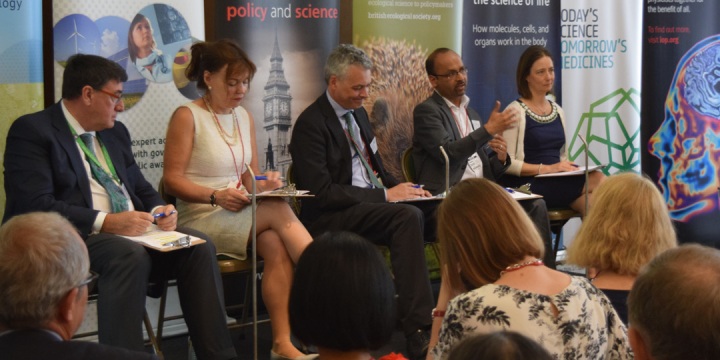By Carmen Coxon, National Institute for Biological Standards and Control
Scientists and politicians both have a tendency to over promise (usually with the best of intentions!) and under deliver (life never really works out how you expect, right?). By the end of the 30th Parliamentary Links Day I also got the impression we share something else – a desire to ensure that UK science remains at the top of its game and that the UK scientific research community is well supported. I felt that the speaker, Rt Hon Mr Bercow MP, and those on the cross-party Committee on Science and Technology are extremely passionate about science and engineering and that they are doing all they can to ensure scientists in the UK have a future. Mr Bercow stated that ‘not many MPs are deeply versed in science, and that is a weakness’ – it certainly sounds like science needs better representation in Parliament. However, both jobs are extremely demanding, and it would take a very determined and driven person to succeed at both! Mr Bercow also acknowledged that ‘Brexit poses a challenge to well-established relationships important to scientists and engineers’ – we are all aware of this problem and only time will tell how much of an impact it has on all of us.
The theme of the event was ‘Science and the Industrial Strategy’, with the morning divided into two sessions. The first dealt with ‘The Mission’, while the second dealt with ‘The Target’. A number of recurring topics ran through the day, mainly investment, diversity, access to skilled workforce, and better communication between scientists, business, government, and the public.

Investment
Following the first discussion panel, Norman Lamb MP, Chair of the House of Commons Science and Technology Committee, began by asking if Parliament is doing enough to support science. He voiced concerns over science investment and that the UK is behind other leading economies (just 1.7% compared to around 3% GDP in countries such as the US) and stated the importance of translating core science into enterprise that can feed back into science investment, while ensuring that core science is not neglected. Mr Lamb also spoke of the intended plans to redistribute funding outside of the ‘golden triangle’ (Oxford, Cambridge, and London), with the £115m Investment in Places Fund, as well as the Small Business Initiative, which aims to connect small businesses with public sector requirements to drive innovation and research.
Rebecca Endean, the Director of Strategy for UKRI, spoke about how we can ‘get more bang for our buck’. Three key focuses were mentioned – to work globally, support talent through equality and diversity, and support and encourage research integrity and innovation. She ended by encouraging scientists and government to engage the public and identify areas to which we can apply scientific expertise to solve problems.
Chi Onwurah MP, the Shadow Minister for Business, Innovation and Skills, had been the first to address the issue of finance, saying that the Labour government wants to increase investment in science to 3% and put us on a level pegging with other industrialised nations. This financial support would come from public investment, industry, and the global investment bank. She said that Labour wants to build an ‘innovation nation’ and that ‘science is in our DNA’. Like Mr Bercow, she also emphasised the importance of communication between scientists and politicians, stating that together they are the ‘twin engines for progress’.
Better communication
Following Onwurah, Dr Patrick Vallance, the Government Chief Scientific Advisor spokeon the need for better communication and more interaction between scientists and policy makers. He said that we all need to make sure that we are on the same page and try to find a ‘common language’ to facilitate a clear dialogue that will help to define problems and find solutions. Data visualisation and understanding was also mentioned – scientists need to make things clear so that the message isn’t lost and can be understood by policy makers and the public. Information must be understandable, accessible, and timely. He concluded by echoing Mr Bercow’s comment that we need more scientists and engineers in government.
Panellists also discussed how we need to marry the creative academics with the focused and driven industry scientists. We lag behind the rest of the world in terms of supporting small and growing businesses but that we need to encourage small businesses, as their success is key to meeting the private investment targets in the Strategy. This relies on us all communicating effectively.
A happy and healthy workforce
A theme running through the event was how the industrial strategy would ensure we have the diversity and skills we need in the research community to deliver. Multiple speakers, including Chi Onwurah, highlighted the importance of diversity within STEM, and Professor Dame Carol Robinson emphasised the need for more training opportunities for talented people such as technical and support staff, as well as better teachers. It was also highlighted that we must embrace emerging digital technologies and artificial intelligence to drive progress.
Somewhat surprisingly to me, Rebecca Endean also acknowledged the struggles of early research career scientists with regards to financial instability and maintaining a stable home life, and also mentioned the increase in mental health problems within our research community. How these problems were going to be tackled was not discussed, but the fact that this is something politicians are aware of is extremely encouraging.
The future
In summary, the meeting left me with the feeling that Parliament is aware of the struggles facing early career scientists and that we need financial support, a skilled and mobile workforce, and closer interactions with the public and the government. This all sounds fantastic, but as alluded to in my opening paragraph, there is always a tendency to over promise and under deliver in both science and government. But hope springs eternal!
Sir John Bell’s report on the industrial strategy can be found here.
 About me
About me
I am a government scientist at the National Institute for Biological Standards and Control. I came here in 2017 after failing to be one of the 1% of PhD graduates that makes it in academia. Although not for want of trying! Being a government scientist is different to being an academic scientist – your goals are rational and achievable, the time allocated to do your work is sensible, and you really do make a difference to people’s lives. Who knew?!

